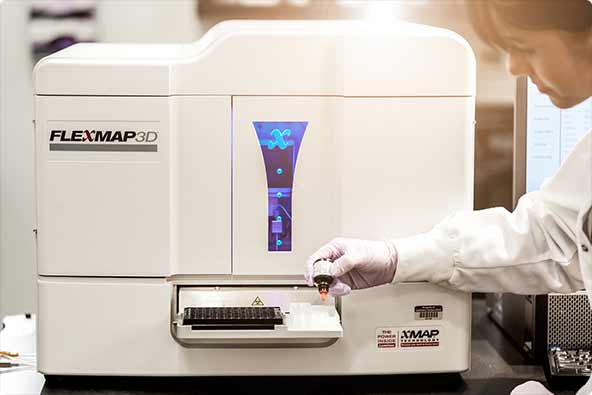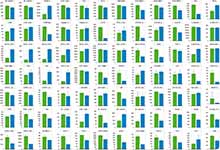Powered by Luminex beads, DigiWest reinvents the Western blot

About a year and a half ago, we introduced blog readers to a cool new alternative to the laborious Western blot: DigiWest®, a highly paralleled protein expression technology developed by scientists at the University of Tübingen. The approach combines xMAP® bead-based multiplexing technology with the concept of a Western blot immunoassay, allowing users to generate data from up to 800 proteins per sample — including the identification of more than 260 post-translational modifications, such as phosphorylation.

When we first wrote about DigiWest, the scientists behind the method had demonstrated proof of concept. Now, their various clients and collaborators have released a number of publications showing how powerful and versatile this approach is. Consider these examples:
- Modes of Action of Cancer Drugs: A prominent case was recently published by drug maker Bayer’s scientists: In preclinical PDX models of hepatocellular carcinoma, DigiWest profiling of more than 100 total and phosphoproteins identified factors that point to differences in the modes of action of cancer drugs regorafinib vs sorafenib, which may help explain why regorafenib works in some sorafenib-refractory patients. Kissel et al. Antitumor effects of regorafenib and sorafenib in preclinical models of hepatocellular carcinoma. Oncotarget 2017.
- Mechanism of Evi-deficiency Mediated Cell Death: In a study from the DKFZ lab of Michael Boutros on autocrine Wnt signaling, Evi-deficient vs control mouse embryonic stem cells were analyzed by DigiWest profiling of 167 total and phosphoproteins, which yielded insights into the mechanism of Evi-deficiency mediated cell death, most notably revealing two players that could not be identified by transcriptional or genomics methods. Augustin I, et al. Autocrine Wnt regulates the survival and genomic stability of embryonic stem cells. Science Signaling 2017.
- Platelet Biomarkers for Ovarian Cancer Diagnosis: In this paper by a collaboration of scientists from Karolinska Institute, DigiWest provided valuable help in parallelized verification of protein marker candidates to develop a panel of platelet biomarkers for ovarian cancer diagnosis. Lomnytska M, et al. Platelet protein biomarker panel for ovarian cancer diagnosis. Biomarker Research 2018.
- Protein Compositions of Microvesicles and Exosomes: Within a study performed in Julia Gross’s lab at the University of Goettingen, DigiWest profiling of extracellular vesicles confirmed the distinct protein compositions of microvesicles and exosomes. Menck K, et al. Neutral sphingomyelinases control extracellular vesicles budding from the plasma membrane. J Extracell Vesicles 2017.
- Mechanism of the Constitutive Androstane Receptor: In this collaborative effort led by INSERM scientists, DigiWest was used for profiling of primary human hepatocytes in a study about the mechanism of the Constitutive Androstane Receptor. De Boussac H, et al. Epidermal Growth Factor represses Constitutive Androstane Receptor expression in primary hepatocytes and favors regulation by Pregnane X Receptor. Drug Metab Dispos 2017.

One of the most remarkable things about DigiWest is how little material is needed for high-quality results: just 60 µg of protein makes it possible to quantify as many as 800 analytes. It also requires no enrichment, a nice advantage over mass spec.
DigiWest is available as a service through NMI TT Pharmaservices, part of the Natural and Medical Sciences Institute at the University of Tübingen.
Resources
- Getting Started with xMAP® Technology [VIDEO]
- xMAP® Cookbook to Design Your Own Assays [DOWNLOAD]
- Find Partner Kits with xMAP® Kit Finder [SEARCH TOOL]
- DigiWest® : Reimaging Western Blotting on the Proteomic Scale [BLOG]
- Luminex Licensed Technologies Partner Spotlight: NMI Natural and Medical Sciences Institute [BLOG]
- Shooting for the Moon – Proteogenomics – The Next Leap in Precision Cancer Care [BLOG]
